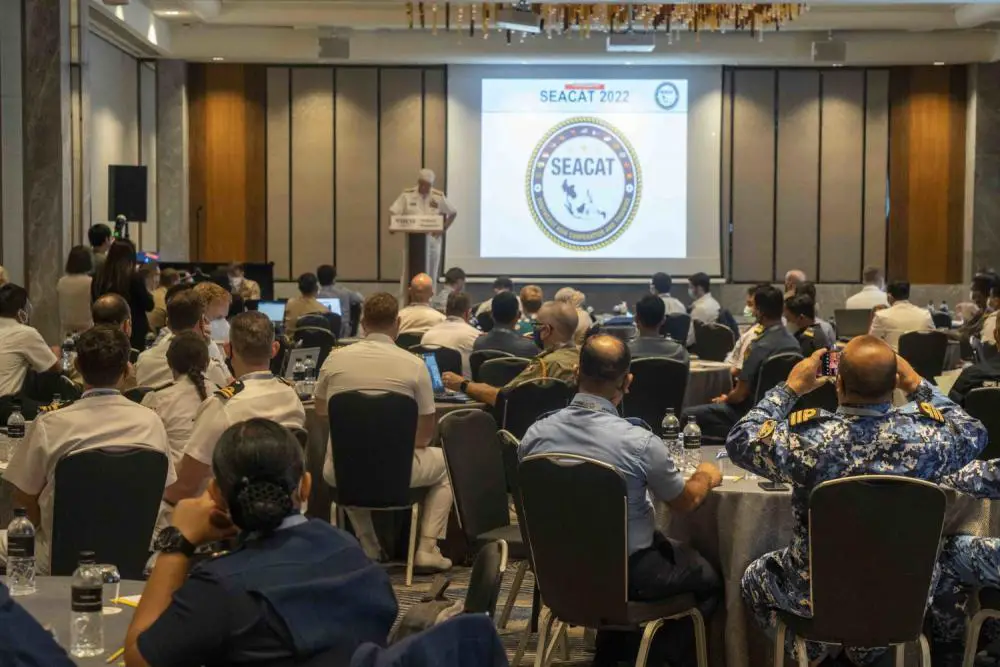Maritime forces from 21 Indo-Pacific partner nations, including the U.S. Navy, and non-governmental and international organizations, began the 21st iteration of Southeast Asia Cooperation and Training (SEACAT) in the Republic of Singapore, Aug. 16, 2022. SEACAT is a multilateral exercise designed to enhance cooperation among Southeast Asian countries and provide mutual support and a common goal to address crises, contingencies, and illegal activities in the maritime domain using standardized tactics, techniques, and procedures. SEACAT 2022 is a return to full-scale, in-person exercise following primarily virtual engagements and non-contact sea phase the previous two years. SEACAT is about learning how to share information effectively between likeminded partners. The COVID-19 pandemic introduced many unique challenges that required creativity and flexibility in maintaining operational readiness, as well as our linkages with allies and partners.
SEACAT promotes shared commitments to maritime partnerships, security, and stability in Southeast Asia. Twenty-one nations will participate, including Australia, Bangladesh, Brunei, Canada, Fiji, France, Germany, Indonesia, Japan, Malaysia, Maldives, New Zealand, Peru, Philippines, Republic of Korea, Singapore, Sri Lanka, Thailand, United Kingdom, United States, and Vietnam. This iteration of SEACAT includes a maritime domain awareness (MDA) seminar and visit, board, search, and seizure (VBSS) workshop Aug. 16-18. The seminar will feature presentations, live question and answer sessions, panel discussions, and interactive, small group breakout sessions with representatives from all participating nations. The VBSS workshop will be led by members of the U.S. Coast Guard Maritime Security Response Team (USCG MSRT).

An additional aspect of the shore training is an unmanned aerial systems (UAS) workshop that will cover a broad range of UAS and the tactics, procedures, and ways that SEACAT participants use these systems to develop MDA. During week two of the exercise, in conjunction with the sea phase, a maritime operations center in the Information Fusion Center in Singapore will serve as a centralized hub for crisis coordination and information sharing in the tracking of a contracted merchant vessel simulating a suspicious vessel of interest travelling throughout Southeast Asian seas. Countries will work with all available MDA tools to provide cueing and contact information to another country’s operations center and maritime patrol reconnaissance aircraft or surface assets with the stated goal of enforcing international rules, laws, and norms.
The sea phase will include boarding operations by multiple nations across the contracted vessel designed to provide training opportunities in real-world at-sea environments. USCG MSRT members will embark the vessel and facilitate participants’ VBSS training. International organizations, non-governmental organizations, and academia will play a role in SEACAT by providing greater understanding of the operational environment through presentations and scenario injects designed to simulate real world situations that enhance understanding and adherence to accepted rules, laws, and norms. Participants include members of EU Critical Maritime Route Wider Indian Ocean (CRIMARIO), International Criminal Police Organization (INTERPOL), International Institute for Strategic Studies (IISS), Lee Kuan Yew School of Public Policy, National University Singapore (LKYSPP NUS), The Pew Charitable Trusts, Risk Intelligence, S. Rajaratnam School of International Studies (RSIS), Stable Seas, and United Nations Office of Drugs and Crime (UNODC).












